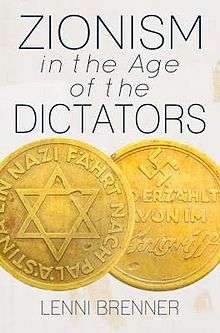Zionism in the Age of the Dictators
 | |
| Author | Lenni Brenner |
|---|---|
| Country | England |
| Language | English |
| Genre | Historical writing |
| Publisher | Croom Helm Ltd |
Publication date | 1983 |
| Media type | Book |
| Pages | 334 pages |
| ISBN | 978-0985890995 |
Zionism in the Age of the Dictators is an 1983 work by American Trotskyist Lenni Brenner.[1] The book makes the argument that Zionist leaders collaborated with fascism particularly in Nazi Germany in order to build up a Jewish presence in Palestine. The book features on its cover a medal struck by Nazi Propaganda Minister Joseph Goebbels to commemorate a visit Baron von Mildenstein of the Nazi SS elite corp made to Palestine as guest of the Zionist Federation of Germany.[2]
Zionism in the Age of the Dictators is one of two works by Brenner on the alleged "collaboration" between Zionism and Nazism. Brenner returns to this topic in his 2002 work 51 Documents: Zionist Collaboration with the Nazis.
Criticism
Upon its initial publication the book received a positive review in The Times, with Edward Mortimer describing it as "crisp and carefully documented".[3] However, C.C. Aronsfeld was critical in a review published in the journal International Affairs, stating that "Brenner has produced a party political tract that unhinges the balance of history by ignoring too many difficulties, especially psychological. For once Stalinists will be pleased with the work of a Trotskyist".[4] In the wake of the controversy regarding Ken Livingston's comments on Adolf Hitler and Zionism in 2016 (see below), the book attracted further critical comment. Social historian David Rosenberg argues that Zionism in the Age of the Dictators is "badly written and with poor scholarship – a piece of tabloid journalism glued together with selective facts and lots of conjecture".[5] Brenner has stated that American publishing houses were not willing to print his work due to its controversial nature, and that his publishers (Croom Helm Ltd.) "gave [him] an ultimatum", saying "You are about to write the most controversial book imaginable ... So there can be no mistakes. You must send us a photocopy of every document you quote."[2]
Thomas Weber, a professor of history and international affairs argues that "Brenner's book lies well outside academic mainstream. It is mostly celebrated either by the extreme left and by the neo-Nazi right";[1] among others, the Institute for Historical Review – defined by the Southern Poverty Law Center as an extremist neo-Nazi organisation promoting Holocaust denial[6] – has cited the book in their research.[7] However, Brenner has criticised and condemned the use of his work by neo-Nazi Holocaust deniers.[1]
Socialist writer Gerry Ben-Noah wrote a critical review in the pamphlet Workers' Liberty. Ben-Noah argues that Brenner "creates a fantasy world in which the Zionists did wish for and expect the Holocaust, and in which the most fanatical Jewish nationalists were in reality, ardent anti-semites".[8] Highly critical of the argument that "Zionists saw anti-semites as nationalists like themselves with a common objective in the removal of Jews from Europe" Ben-Noah asks rhetorically "where does one begin to review work like this?".[9]
Ken Livingstone controversy
Zionism in the Age of the Dictators found itself at the centre of the political scandal in the United Kingdom when in 2016 the former Mayor of London Ken Livingstone made remarks arguing that Hitler had supported Zionism in the 1930s. Following these remarks Livingstone was suspended from the Labour Party. Livingstone argued that Zionism in the Age of the Dictators "confirms there was clearly an ongoing dialogue [between Zionists and Nazis] even if the Israeli government now tries to pretend that none of that all happened".[1] Livingstone has indicated he intends to use Brenner's work when appealing his suspension.[1]
See also
References
- 1 2 3 4 5 Ben Quinn. "Ken Livingstone cites Marxist book in defence of Israel comments". The Guardian.
- 1 2 Lenni Brenner (24 February 2014). "Zionism in the Age of the Dictators". CounterPunch.
- ↑ Mortimer, Edward (11 February 1984). "Contradiction, collusion and controversy". The Times. p. 14. Retrieved 27 July 2016 – via Times Digital Archive. (subscription required (help)).
- ↑ See International Affairs (Royal Institute of International Affairs 1944-), Vol 60, No. 1, (Winter 1983-1984), pp. 138-139
- ↑ William Watkinson. "Benjamin Netanyahu and Lenni Brenner: What is Ken Livingstone basing his Hitler-Zionist comments on?". International Business Times UK.
- ↑ "Institute for Historical Review". Southern Poverty Law Center. Retrieved 2 May 2016.
- ↑ Weber, Mark (July–August 1993). "Zionism and the Third Reich". The Institute for Historical Review. 13 (4): 29–37. Retrieved 2 May 2016.
- ↑ Ben-Noah, G. (1984) Brenner on the Nazi Massacre, Workers' Liberty Pamphet, SO 199, 4.10.1984 http://www.workersliberty.org/system/files/brennerreview.pdf
- ↑ Ben-Noah, G. (1984) Brenner on the Nazi Massacre, Workers' Liberty Pamphet, SO 199, 4.10.1984 http://www.workersliberty.org/system/files/brennerreview.pdf
